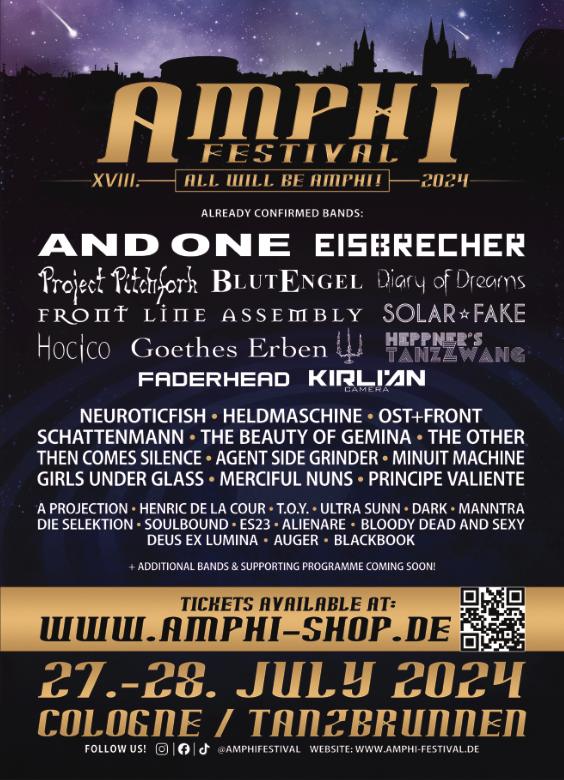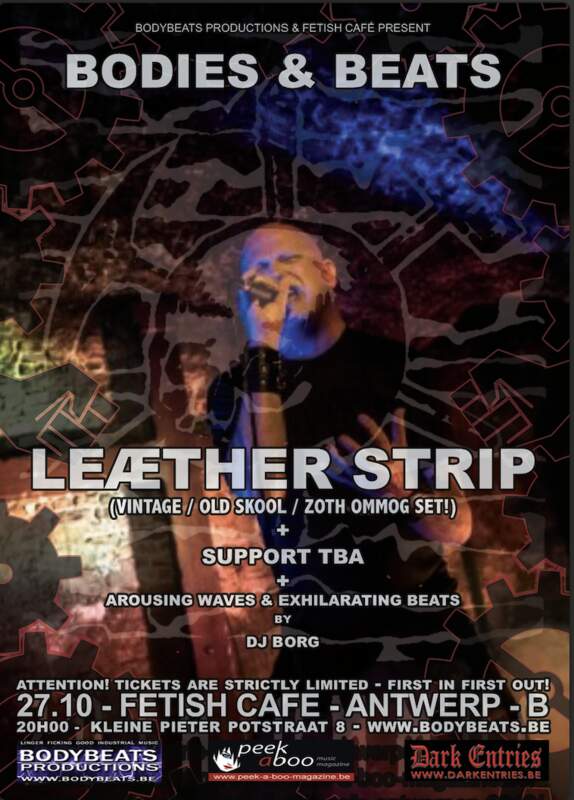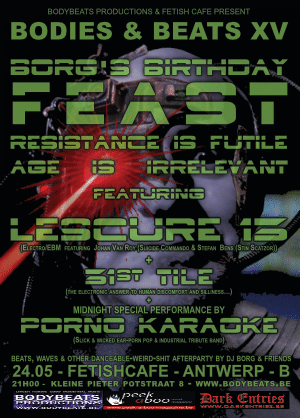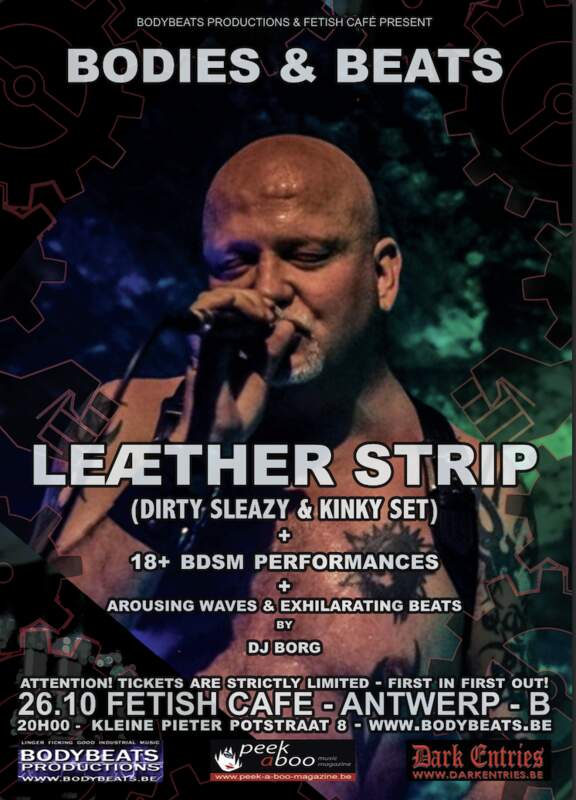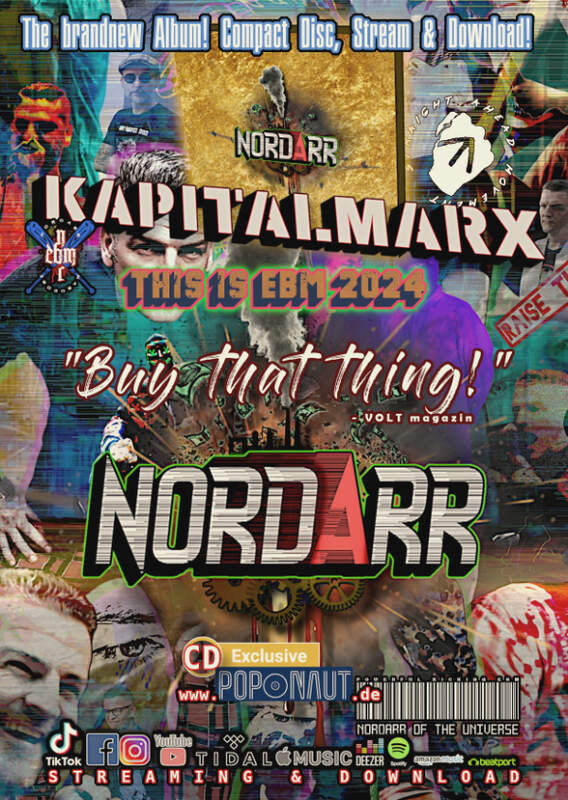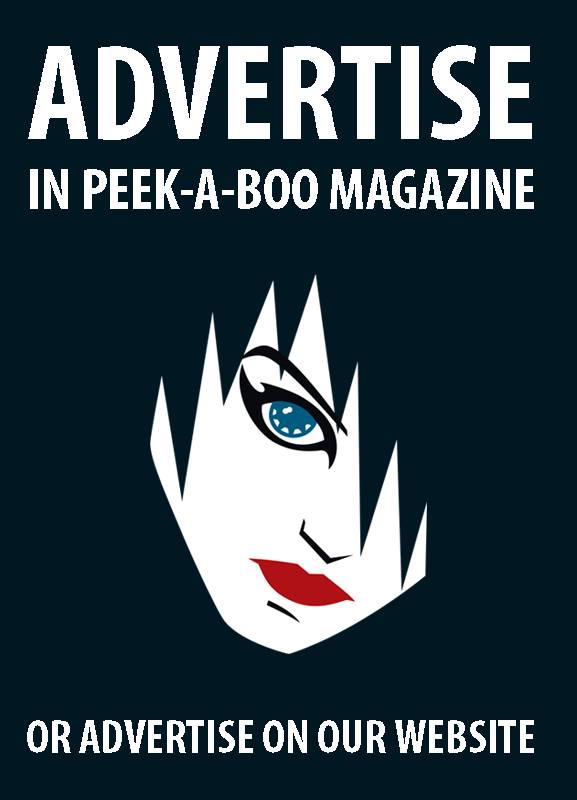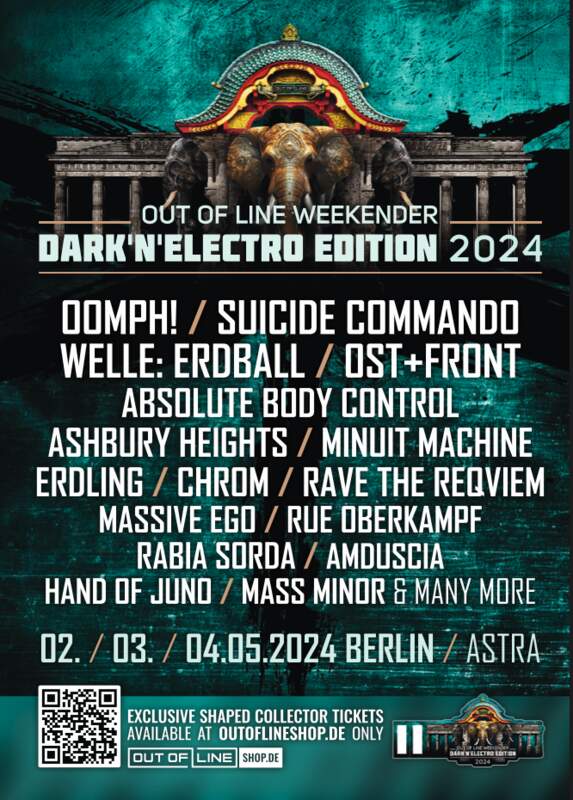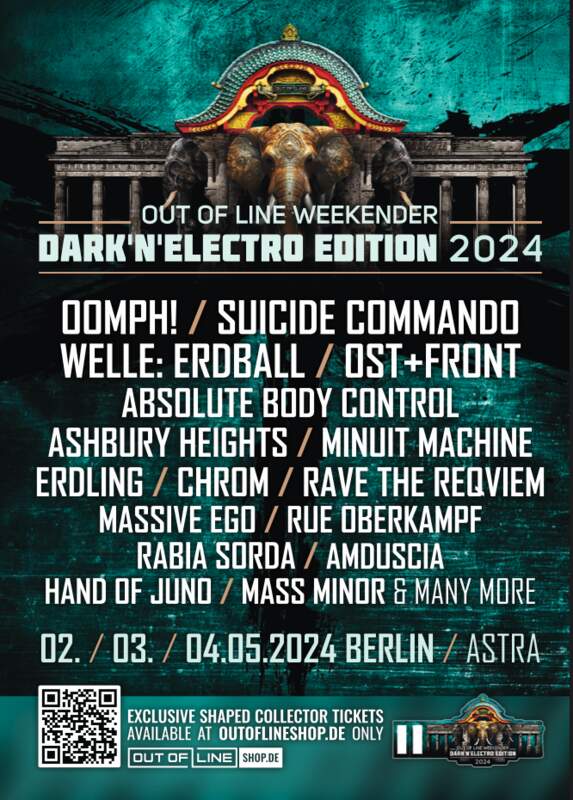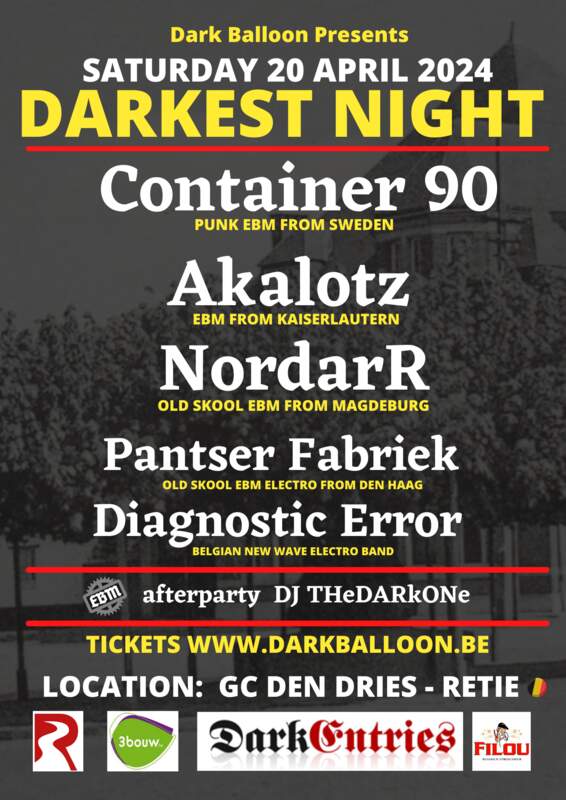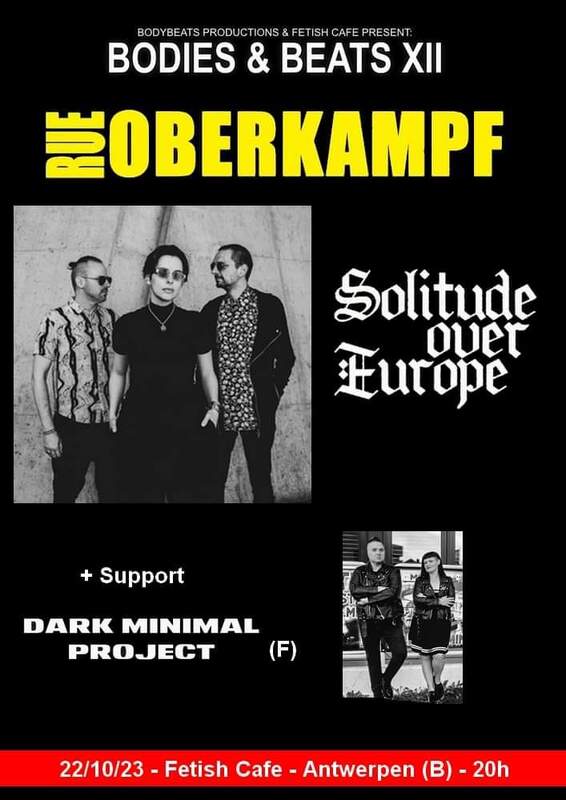THE NAMES
Part I: Some people went to the nearby field with papers and threw cow shit at us.
17/07/2015, Xavier KRUTH
The Names had their years of glory at the start of the eighties, working with Factory Records and legendary producer Martin Hannett and producing hits as ‘Calcutta’ and ‘Nightshift’. Now, they are back with a landmark double album: ‘Stranger than you’. The story behind that disc is that of a rock star who worked his way out of a severe personal crisis by making music. When we met frontman Michel Sordinia in Brussels, we warned him that we had a lot of questions. He replied that he would give shorter answers as usual. He didn’t, and so we talked for almost two hours and a half about every aspect of The Names. The interview is published in three parts. Part one: the new album and the starting years (1977-1980).
Hi Michel. The new CD is called ‘Stranger Than You’. It is the fourth CD - if we include the Jazz CD - since 1977. So, why this new cd?
The first answer would be: why not? There comes a time when everything you do turns up to bring you back to essentials. That’s what happened to me after ‘Monsters Next Door’ and the whole string of concerts that we gave all over Europe. It stopped like three years ago. It was a great time and we were planning an album. But then I personally encountered some problems: family situations, situations with work and with myself. I went through a very dark phase. I reconnected with the darkest me, that I probably didn’t see that much since I was a teenager. I realised that I didn’t change that much, it was just the way I was reading what was happening to me and inside me that had changed. First I couldn’t do music anymore. I couldn’t concentrate. I had to face so many things that I will not go into. But some of the songs do. And then I felt… I like Robert Wyatt. One of my favourite albums is ‘Rock Bottom’ (an album he wrote after falling out of a window and remaining paralysed from the waist down, hence the album title with its double meaning…, xk). When asked about what I was going to do next with the band, I said: ‘with the band I don’t know, but with what I am living now I will probably write my very own Rock Bottom’. Robert Wyatt had to fall down from a window in the street, but I didn’t have to do that. I’m still intact. But I was really really really low. Then I read a thing that Bob Dylan once said: ‘If you are going down and you’re a songwriter, don’t try to swim, go to the bottom and eventually you will swim up but on the way you will probably write interesting songs.’ And that’s exactly what I did. The lyrics of some of the songs, like ‘My Angel Of Death’ and the very long Berlin-song at the end, were written living through some experiences…
But it all seems a long time ago, because there are a lot of references to old times…
The references come from me liking people and being in Berlin, and being curious about what happened when I was too young to be there. I know Berlin quite well, but I didn’t know it at the time when Bowie and so were making music there. I was living both in a real world where things were happening and at the same time references from my culture came about, things that I love, and that resulted in that strange mix. Of course, like in good movies, when things are inspired by actual intimate experiences, the things that people will remember are often totally fictional and they don’t catch the moments that I really lived through. That’s funny. Those songs, and a few others, were much more intimate and related to a dark experience to live. That was the foundation of the album.
The ‘Why-not’-element is wishing to do a double album. That’s what I told James Nice (curator of Factory Benelux, xk). We had a dinner with him and Peter Staessens, our photographer.
James said: ‘OK. I know you’re better and I know you have songs’.
- Yes, indeed, some of them saved my life.
- And what are your plans?
- A double album.
And he said: ‘That’s a very good idea.’
Why a double album? Because I had many songs, many more than appeared on the album. Some were recorded but not used, which is new. It had to be not just an album. It had to be some kind of a statement, because one of the results of me living through that period is that I sort of got away with whatever inhibitions I still had, both personally and musically. I told James and the members of the band that from that moment on - when we were going to the studio - there would be no stopping. We have stopped like three or four times in the past, but now there will be no stopping. If I survive… I will die making music, and part of it with The Names.
But there’s no double album, it’s an album with sixteen songs…
The double album is the vinyl edition. Do you have it?
No, I only have the CD version.
But you need to have it. It’s really beautiful.
When you see the title ‘Stranger Than You’, there’s this important word ‘strange’, which reoccurs many times throughout the CD.
That is something I realised afterwards.
So there was no concept around ‘strangeness’?
There was no concept. I just got into it. It was a much more intuitive process than the previous album. ‘Monsters Next Door’ was planned in so many ways. I was going more and more into intuitive processes, too things imperfect, a very sensual approach… The new album is like in the old westerns, shooting from the hip. You’re not aiming at anything. Whatever happens, you react to it. Sometimes, you can hit the target. I told the band that I had everything in my head and we would do it trying to be as live as possible, forgetting about the perfect details… The energy must be there. Whatever sounds great is OK. We would push it more to the extreme, which I also wanted to do with ‘Monsters’, except we didn’t because we had to compromise. A very Belgian situation. (laughs)
To come back to the title: of course, there was this quote by René Char - a French surrealist poet - ‘Developpez votre étrangeté légitime’. You’re entitled to develop your legitimate strangeness. You have the right to be. I had this quote in my mind a lot. I used it talking into people, and I understood that I exactly did that. But again: in a very spontaneous way. To the extend that I realised that too many songs were having the word ‘strange’ or ‘weird’ in it. I was tempted to get rid of some of them, but then I said: ‘No, the songs were born that way’. If it’s too much, it’s too much, but all of them are in it.
I thought there was a concert behind ‘strange’, and I thought there was maybe also a concept behind the word ‘change’. Of course it rhymes…
Which is already a good reason. (laughs)
But there’s also… You say ‘don’t change’ to the individual, but to society you say: ‘there is a need for change’. I think about songs like ‘Kids On Fire’ and ‘Boy With A Gun’, which I love. The lyrics to that last song are really great. So, what do you think?
It was not a concept. But I fully realise that it was there. Since I am a film critic, I became sort of conscious of it while mixing the album. And some members of the band too, like my co-producer Thomas Neidhardt. He is our soundman and his English is much better than that of the other musicians. He got it. He questioned me about it and I resisted. You don’t want to analyse yourself and the things you do. And if you do, don’t do it while doing it. So I didn’t. But from a certain moment it became very conscious. Post-prod we used the demonstration sounds at the end of ‘Kids On Fire’ and things like that.
‘Boy With A Gun’ came about while watching a movie about kid soldiers. I was really moved by it and I thought I wanted to react to it. Those songs were written afterwards. So maybe self-analysing myself now - thanks to you, because you’ve got it right - I felt free to write those songs that are more topical and that are more in the world. Because I had so many that were so intimate. It was not a question of hiding these but it was enough of it. So I effectively wanted to reflect some frustrations and aims that I had about the world. I also have teenage kids, who are not really political, though they should.
Yes, and there’s another question. Don’t these kind of political songs sound out-dated in 2015?
No, they’re not. Maybe my kids are not, but a lot of kids are political. We are going to play in Athens in the autumn. I know people there will react to some things I might say in between songs. The Belgian bourgeoisie kids will not. But there are so many things happening, and so many people aware of the important things to do. As a teenager, I was very much involved in political stuff. So it was a bit like reconnecting to things.
One of your kids is also in the ‘Angels of Fire’-choir. That’s a new idea for this CD.
I wrote ‘My Angel Of Death’ with no music. It was just the words. Both ‘My Angel Of Death’ and ‘Kids On Fire’ were lyrics without having the melody, which is very rare. Almost half of the songs on the album were written that way, because it was written as an urge to write, to let it out. Then the music came. It started with ‘My Angel Of Death’. I knew that I had to have a choir of young voices at the end. And I also knew that I needed the laughter, because it’s a very dark song. I wanted to have that irony. It happens that my daughter is very musical. She plays different instruments. We are now in the process of writing things together for the very first time. And it happens that she sings quite well and that three of her best friends - three sisters - are girls that sing in choirs. So it was very easy. They were close to me. I said to the band that we would have a girl choir. For ‘Kids On Fire’, it was not intended. Just a few days before going to the studio I said to myself that it would be cool to have the girls on that one too.
I ask myself if the choir - The Angels of Fire - are acquainted with the history and the musical context of a band like The Names?
To a certain extent, yes. The youngest of the three sisters is the best friend of my daughter since they were in Kindergarten. I saw them grow up. The parents are very close friends. The father is a very good photographer and started following us when we started again in 2007 at the first Factory Night. Two of the girls were already there, then the others joined in. They must have seen the band like six or seven times live. As kids and as teenagers. They know about us. They know the music…
And they also know this kind of alternative new wave scene?
Yes, they’re very much interested in it. It’s not the music that they play as their favourite, but they were totally aware of the kind of things we do and the kind of things we’re coming from.
There are also a lot of references to the past of The Names in the CD. Let’s start with ‘The Passengers’, a song named after the band preceding The Names…
Yes, that one came very late, and we really didn’t know what to do with it. But again, the lyrics came first. Very self-conscious lyrics. I questioned myself maybe a little too much. I would probably not have put that song on an album that would only have six or seven tracks. But since there were 16, I felt allowed to do it. I know that some people will recognise parts of it, even some jokes like having Vincent Kompany in the song. People at Factory Benelux don’t even know who he is. But to me, I like football, so it made sense. And it’s just our story, from the start on.
And I wanted to go to that start. You met in 1977. You knew Christophe…
No. I knew Marc since I was 17(Marc Deprez: guitars in The Names, xk). We started playing together. We had common friends who were also musicians. And we discovered that Marc and I - and maybe also Robert Frackson, who was the lead guitar in the first line-up of the Passengers - were listening to the same stuff. The Velvet Underground, Neil Young, MC5, I was a little more into The Stooges… We started playing covers, than added some new songs. During the whole of 1977, I was travelling to London a lot, to see gigs or whatever. I really did feed my desire to go serious with a band, which I did already when I was at school at 14 or 16. So in the winter of 1977 to 1978, we started playing and looking for other musicians. And so we had Christophe in the band first. He was 16 at the time. He was playing the drums and he had long hair. He had a look to play in The Ramones. And he was playing the drums so fast, like it was at that time.
Because you were a punk band at first…
Yes. Maybe with a little more melodies and more complex lyrics, but we totally embraced that kind of energy. And then Isabelle Hanrez - who was 15 - became our singer. We went out on the scene. The press and many fans embraced us at the time.
I think you were. I just read - by total coincidence - something about the First Belgian Punk Contest - and you were said to be one of the better bands at that contest.
Everybody hated the idea of having punk rock officialised by a contest, winning a price… Also it was Télé Moustique, the French equivalent of Humo…
Humo was also organising it. And there is a story that the contest had the purpose of not having the punks at Humo’s Rock Rally, which was the most important rock contest in Flanders.
Oh, a diversion! (laughs) I didn’t know that.
So the punks had their own contest, and the serious bands could participate in the Rock Rally.
It didn’t work that way actually, because the next summer we were playing at festivals. We were really martians at those festivals. I remember one festival - I can’t remember exactly where, in Herentals or so, it was in Flanders - and we were introduced officially to Ferré Grignard, you know the folk singer from Antwerp area who had a major world wide hit song with ‘Ring, ring, I’ve got to sing’. He was there, totally stoned on the floor saying ‘hi guys’… We were really martians. That day in Herentals, we were quite arrogant. We didn’t care at all. We didn’t give a shit. The people were not receptive to our music, and I remember that at a certain time - we were doing a cover of ‘Femme Fatale’ from The Velvet Underground - Marc and I just sat on the edge of the drums stand, and our singer was singing with her back to the audience. So, some people got out of the field. There was a real field with cows at the side. They took newspapers and they actually threw cow shit at us. That we very elegantly avoided, of course. It went that far.
They couldn’t actually prevent some of the punk bands to penetrate those festivals. Speaking of arrogance… We were meeting almost every night in some places here in Brussels, the main one being ‘Le Café du coin’. It was really the hangout for the punk crowd. It was not a huge crowd, so a small place sufficed. But a lot of important people were there. People that were about to become involved in record labels, in record shops, people who would become lyricists like Jacques Duval. Everybody was there, and we discussed the Punk Contest. Most bands said: ‘We will not go, it’s commercial, it’s shit…’ And I remember saying: ‘Yes, it’s shit. But we will go.’ I was really arrogant. ‘We are going to do the punk contest. We are going to win and we are going to decline the price because it’s shit.’
- And what if you don’t win?
- We will win.
And actually, we did. I remember, we were in Le Vieux Saint Job in Uccle… The venue doesn’t exist any more, but the main punk bands played there: Talking Heads, XTC, The New York Dolls, and we were playing there a lot. They were calling us on stage to get the price. And we said: ‘Fuck the price’. I can’t exactly remember the name, but the band that was second got the price. It was a bloody record deal (for a single, xk), and we didn’t have one. So we managed to beat the hardcore punks on their own terms.
- We did it.
- Well, yeah. It’s because you were lucky.
- It’s because you have a beautiful singer.
- Well, hire a beautiful singer, then…
Then the beautiful singer left…
There was a natural process of evolution for the band, a little sad process too because it meant parting ways with Isabelle (I had decided to tale the lead singing after doing a few duets like a great cover of Richard Hell’s “The Plan”) and also with Robert, our second guitarist. Then Christophe - who was trained as a pianist - switched from drums to keyboards, because we decided to explore more new sounds possibilities. He had already been playing some keyboards from behind the drums. When he switched, we had a whole series of drummers until we found Luc Capelle, who lived through the whole Factory experience. It was at that time we changed our name to ‘The Names’.
And you also changed from punk to more new wave sounds…
We didn’t know what post-punk was about. We found ourselves at some kind of crossroad where some bands in the Brussels scene decided to go cold wave. Others stayed on the punk scene, but most of them were starting to sound like self-parody. We became totally overwhelmed with new bands, especially Magazine. We were still calling ourselves The Passengers when we opened for Magazine at the Ancienne Belgique, and that was probably one of the key moments. When you’re an opening act, most of the times nobody cares. But the audience did because we had quite a crowd following us at that moment. The press was talking about us a lot. So people were expecting us, building up to that concert. Those guys from Magazine were great. They gave us a full sound check, which very few bands got. They were there during the sound check, and they liked it so much that they decided that we would get a full live show. They called the technician and told him to do a whole live show.
- With the white screen and the projections?
- Yes, with the white screen and everything.
They were so supportive. The gig was fantastic. I remember that we opened the concert with a cover of ‘We’re gonna have a real good time together’. There was no music and we were just repeating this sentence, as if we were Kraftwerk. It was totally cold. So everybody was like: ‘A good time? Together? Do they really mean it?’ (laughs) Then the concert went very punkish until we started playing the new songs, which were much more atmospheric and mysterious. The transition was made again by going back to the roots: The Velvet Underground. And Magazine, which we admired. And after that concert, there were reviews by important journalists saying: ‘If a Belgian band has a future in the UK, it’s them.’ My wife Michèle - she was my girlfriend at the time, and also manager of the band - said: ‘We are going to go abroad. First we have to do that record that we are planning.’ That was ‘Spectators of Life’, self-produced.
You mention that in the song: ‘every life has it’s spectators’…
Yes, indeed.
And then you changed the name to ‘The Names’…
It was in the process of preparing that single. You know the anecdote. There was an article in the NME about another band called The Passengers. ‘They’re the future of British rock!’, except it was not the future because they never got further than that article. (laughs) But it was enough for us to smell: ‘We are not going to be the second Passengers’. We went to be The Names, which was totally OK when there wasn’t the internet around. It was very difficult to find us at a certain time. Joy Division, Echo & The Bunnymen, Durutti Column… there you can find yourself very easily. Now it’s not a problem anymore because we did enough things.
So we recorded that single, and it was released through WEA, with whom we had some conflicts. We were like ‘ow, these British labels with bands that we admire so much… maybe it’s a little too big’ But Michèle didn’t think so. So we sent the EP to Fiction. We were actually enjoying what Fiction had. Not only The Cure. There was a band with a girl singer called The Passions that I really liked. Eventually, we did a cover of ‘I’m in love with a German filmstar’ - which was whatever close to a hit they got - during the Jazz sessions (Jazz was the name of the band during a reunion in 1996-1997, xk). And we went to see Rob Gretton.
At that famous concert of Joy Division…
At that famous concert, yes. We were pretty sure that the record would never get intact in Manchester, because Rob was in Rob’s fashion… I don’t want to know what he had, but he was nice and he had this attaché case. He put the record in it: ‘Yeah, we will listen to it.’ I thought it would be broken before he arrives. Except that one week later, maybe five days later, Michèle got a call from northern England.
Michel Duval?
No, Michèle my manager. We were very young and she was living with her parents. I was too. She was at home and she didn’t understand at all. She phoned me: ‘Someone called me. I think it’s from Manchester, but I didn’t understand anything. Here is the number…’ I phoned them and I was told that they liked it, that Martin Hannett wanted to work with us. Would we agree to meet Tony Wilson? He was coming with another band a few weeks later - I think it was A Certain Ratio that was playing in the Plan K - and we shook hands on the project.
There was no contract. It was a shake of the hand.
Yes. The interesting thing was that in the meantime - before Tony was coming to Brussels - we got a yes answer from Chris Parry (manager of Fiction, xk). When there was some disagreement within the band about the way we were treated by Factory, some voices said we should have signed with Fiction. We would probably have got John Leckie as a producer, it would have been more commercial and certainly marketed in a more efficient way. But at the same time, we wouldn’t be here having this conversation if we had been on Fiction. Because the legacy is not on Fiction, it’s on Factory. I had no idea of that at the time, but it was about music, it was about doing things. It was not about the money. So we went for Factory, and it was great. Except for the lack of money, except for the decisions they took like when Nightshift was sold out after 10 days and they decided not to reprint it. (takes a low voice) ‘We’re going to make a collector out of your single…’
But you had the other offer from Fiction, which you refused…
We replied very politely, saying that we had plans with Factory.
Pictures:
- The Names pic for Stranger Than You
- The Passengers in Grimbergen
- The Passengers at the Punk Contest
- The Names early TV appearance
- Early The Names pic
Xavier KRUTH
17/07/2015
Next interviews
THE NAMES • Part II: I still have a letter at home from Factory that starts with: ‘Of course there is no money’.
THE NAMES • Part III: I decided that I liked the darkest me. But I wanted to live with darkest me, not die.
ANDY THE KID • Set trends, don’t follow them.
MACHINISTA • Every time you create music you find new better tricks, so let´s hope we can push the sound even more for the future.
IIOIOIOII • I want to reach as many people as possible and share my music with them
SOUND & VISION • Sound & Vision is more than ever a combination of new wave and other musical influences that have crossed my path over the past thirty years.
NAïVE • We decided to approach our sound slightly...
THE INSIGHT • I don’t fucking mind about being played in France or being famous. I just want to play the music I want
EXIT STRATEGY • The themes of Exit Strategy vary but all of the material embraces the need for change in the human race and its approach to life on mother earth
PORTION CONTROL • We have always been keen users of technology and this continues to this day.
Other reviews from THE NAMES
THE NAMES • We're lucky to have everyone still alive and well, unlike many of our friends of Factory records.
THE NAMES • Part II: I still have a letter at home from Factory that starts with: ‘Of course there is no money’.
THE NAMES • Part III: I decided that I liked the darkest me. But I wanted to live with darkest me, not die.







